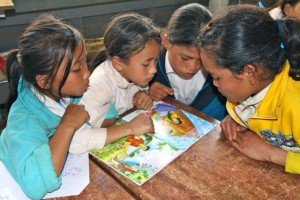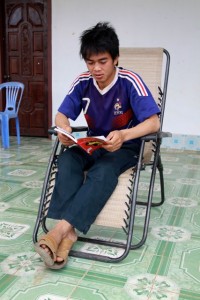Project Sekong 2012: Teachers so value the new books that we have to admonish them: “It’s alright if students wear them out!”

Because teachers treasure the books we deliver, we always have to reassure them that our donors will not be disappointed if students subject them to the wear and tear that comes from normal, hands-on use.
Report 42
When Yai and I rooted around in the storage room at the Dak Door Primary School, we found a steel box labeled UNICEF that contained maybe three-dozen children’s books. It was an uncommon find for a Lao school; we often quote the National Library of Laos statistic that more than 90 percent of all Lao schools lack any printed reading material.
The find didn’t dissuade us from making the Dak Door school a recipient of one of our Book Box libraries. The school has an enrollment of over 150 students, so an inventory of thirty or forty books is hardly adequate. But one thing puzzled me.
The books looked to be in near-new condition. Were they a recent acquisition? When we inquired about the source of the books and how the school uses them we got a sad but interesting reply.
The head teacher explained that she considered those books a treasure, so valuable that the staff has reserved their handling to teachers alone. In essence the books have become a reserved source of “read-alouds”, in pristine condition because only adults have touched them.
The teacher added, “We are worried that if the people who gave us the books visit, they will be angry if we have not taken good care of them”. Yai and I both hooted.
We’ve been through this before, and Yai has perfected his translation of my unequivocal instructions:
“Mr. Jim is the opposite. If he comes back in five years and the books are in perfect condition he will be very sad. These books are for students to read. We know that someday students will wear them out. The most important thing is that students hold the books in their own hands and read the books themselves!”

The term "lost literacy" refers to the fact that many villagers who have learned to read in school never have a chance, once they leave school, to read again. Shortly after teachers in Dak Den village introduced a check-out system, we began seeing older villagers reading books that children in their family brought home.
In the days since, we’ve visited the school again and have seen evidence of a break-through. Teachers have implemented a checkout system so students can take books home. Our hope is that by sending books home, teachers will enable students to impress parents with their growing reading skills and thus build parental support for education. In addition, older family members who learned to read during their school days but have lacked an opportunity to read since may, through exposure to the books, rescue their fading skills.
There’s no preschool program in this village so young children have no opportunity to set their eyes on a reading model. Hopefully, when books arrive home in the hands of older siblings preschoolers will get a “head start” experience with literature that no previous generation in the village has ever enjoyed.
Yes, the school will lose some books. Yes, some books, probably the most engaging, will someday be thick with grime. But… what American library doesn’t find books returned with torn pages or a soiled cover?
Truly, the only thing that could break my heart is if I returned in a few years and the books looked as new as the day we delivered them. Read on students! Wear these books out!

Hi, Jim:
I have so many children’s books here, many from my days as an editor of children’s books at Houghton Mifflin, but since they’re in English I’m assuming they aren’t what you’re looking for. HOWEVER, in my second career as home care nurse for high-risk families, I found that wordless picture books were fabulous for some of my patients, many of whom were illiterate or semi-literate parents. They were so happy to be able to share a story with their kids, using their own words and imagination to narrate. It makes books friendlier, too.
Andrea